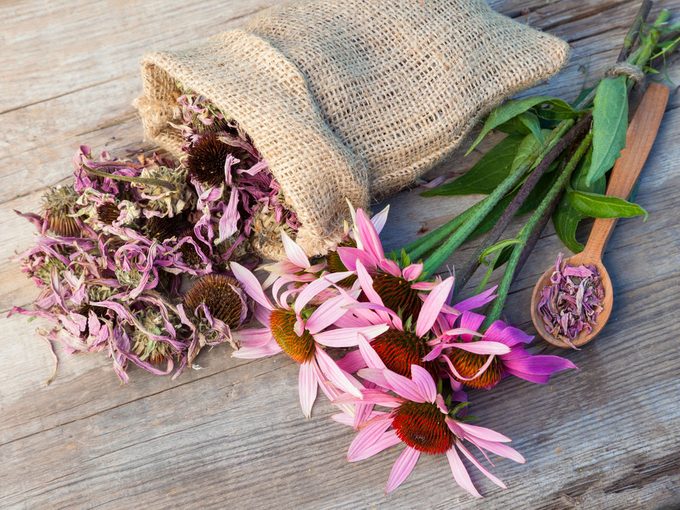Echinacea: A Natural Remedy That Protects Your Immune System and Helps Prevent Colds
Echinacea is more popular than ever, used most often to prevent or cure the common cold. Does it really boost your immune system; just how effective is it?

Source: The Amazing Healing Powers of Nature, Reader’s Digest
Echinacea is an immune system booster that is used to prevent and treat colds
Echinacea is a plant-based natural remedy, most often used as a tincture to fight the viruses and bacteria that cause common colds.
Echinacea flowers are easy to grow and consist of a conical orange spiky head surrounded by pale pink to purple petals. Both the root and flower are used medicinally.
How to use echinacea
There are many echinacea preparations on the market’tinctures, powders, dried, teas and capsules. Along with being sold in various forms, different products use different parts of the plant and different species of Echinacea.
University of Connecticut researchers reviewed 5 echinacea studies and found that a liquid extract made from fresh, aboveground parts of the species E. purpurea consistently reduced chances for catching a cold. When using echinacea extract, follow the package directions carefully.
Skip this herb if you are allergic to ragweed, chrysanthemums, marigolds or daisies.
RELATED: 3 Simple Sore Throat Remedies
Do a freshness test
To find the best alcohol-based echinacea tincture’or to judge the freshness of one that’s been sitting in your medicine cabinet’put a drop on your tongue. A tingling or numbing sensation means you’ve got a winner. Scientists say the ‘tingle test’ reveals the presence of compounds called isobutylamides. Found in echinacea leaves, flowers and roots and in high-quality remedies, isobutylamides help white blood cells in the body engulf and destroy invading viruses and bacteria.
A brief history of echinacea
Before antibiotics, there was echinacea. This North American botanical was widely used by native peoples and settlers for colds, flu, wounds, sore gums and even venereal disease. It fell out of favour when bacteria-vanquishing sulpha drugs burst onto the scene in the middle of the twentieth century, but a German-led revival in the use of echinacea as a cure for the common cold has given this herb a prominent place in health food stores and newspaper headlines.
RELATED: 5 Myths and Truths about Colds and Flu
Modern studies and research on echinacea
Research in the 1990s suggested that echinacea could prevent colds and short-circuit sniffles, congestion and that run-down feeling you get if you do catch one. But many of those studies were sponsored by remedy manufacturers and not rigorously conducted, so scientists stepped in with better-designed experiments. Alas, the results were often ‘flatly negative,’ as one echinacea researcher from the University of Wisconsin-Madison described his own results.
In 2002, a pair of National Institutes of Health studies found that the dried roots of 2 species, E. purpurea and E. angustifolia, didn’t ease symptoms in adults and that E. purpurea juice didn’t help colds in kids, either.
A 2005 study at the University of Virginia, in which 437 brave volunteers agreed to have cold viruses dripped into their noses, sought to fix a fault critics found with the earlier study’namely that participants didn’t take echinacea ahead of time, as they might in the real world. In the new study, half the volunteers took echinacea for a week beforehand and half got a placebo. They all then spent 5 days in hotel rooms while scientists monitored their symptoms and immune system response. The verdict: echinacea was a dud; it didn’t help treat cold symptoms or improve immunity.
However, as the disappointing results mounted, herbalists began pointing out problems with the research. Higher doses or an alcohol extract of fresh echinacea flowers and leaves might have worked better. Starting to take the herbs sooner could have improved the outcome. After a University of Wisconsin study of 719 people with cold symptoms found no ‘statistically significant’ benefit for echinacea, the executive director of the nonprofit American Botanical Council pointed out that ‘echinacea products are not all alike.’
It was a valid point. Levels of active ingredients that seem to boost the immune system vary in different echinacea species and in different parts of the plant, and in fresh versus dried plants. Doses vary, too. That means the healing potential of different echinacea products may vary widely, as well. Underlining this, a 2007 University of Connecticut review of 14 echinacea studies found glimmers of hope. The researchers concluded that taking echinacea at the start of a cold could shorten its duration by 1.4 days, while taking it regularly during cold season could cut your risk for catching a cold in half.




